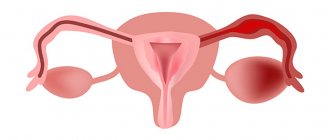Throughout her life, a woman has to experience a variety of sensations associated with the functioning of the genital organs. Some of these sensations are short-term, while others associated with pathologies can cause anxiety for a long time.
Some sensations are very difficult to describe in words, such as pulsation in the vagina. In some cases, such incomprehensible symptoms are frightening. Why does the vagina pulsate?
According to doctors, the vagina begins to pulsate due to muscle contraction, and this behavior is normal, and therefore has nothing to do with pathology. If a woman tries to describe uterine contractions, she explains her sensations as rhythmic twitching. Could such symptoms be associated with some pathology?
Causes
In some cases, tingling in the vagina is actually one of the symptoms of infection. However, there are other reasons for such sensations. The most common problems that cause burning and itching in the vagina:
- menopause;
- dyspareunia (painful sexual intercourse);
- endometritis;
- salpingo-oophoritis;
- rupture of the sacrouterine ligaments.
It happens that when taking hormonal contraceptives, pregnancy, lactation or menopause, a woman experiences hormonal changes in her body. One of the symptoms of a sharp decrease or increase in the amount of estrogen in the female body is tingling in the vaginal area. Sexually transmitted diseases such as herpes or gonorrhea also cause itching and burning in the perineum.
Treatment.
Treatment for vulvodynia is aimed at relieving symptoms and does not have a universal regimen. For many patients, a combination of different procedures is most effective. Sometimes it takes a significant amount of time to select the right treatment method, as well as a long period after the start of therapy, before obvious relief occurs.
Known treatment options:
Drug therapy . Steroids, tricyclic antidepressants, or anticonvulsants may help relieve chronic pain. Antihistamines will relieve itching.
Therapeutic auto-training. This therapy will help reduce pain by teaching you to relax your pelvic muscles and control your body's response to illness.
Local anesthesia. Topical medications such as lidocaine ointment provide temporary relief of symptoms. Your doctor may recommend using lidocaine 30 minutes before sex to reduce discomfort. Please remember that using lidocaine ointment may cause your partner to experience decreased sensation and temporary numbness in the skin of the penis after sexual intercourse.
Nerve blockades. Women who have long suffered from pain that has not responded to other treatments may benefit from injectable nerve blocks in the vulva area.
Pelvic floor therapy. Many women with vulvodynia experience hypertonicity of the pelvic floor muscles, which support the uterus, bladder and bowels. Exercises to relax these muscles can help relieve the pain of vulvodynia.
Surgical intervention. In cases of localized vulvodynia or vestibulodynia, surgery to remove skin and tissue (vestibulectomy) from the affected area relieves pain in some women.
Infections
Pathogenic microbes, viruses and fungi constantly attack a woman’s body. Insufficient or improper genital hygiene, frequent changes of sexual partners, constant wearing of thongs - all this can contribute to the appearance of infection in the vagina.
Many women don't even realize that washing from back to front contributes to the development of a bacterial infection. During this process, E. coli enters the vagina from the rectum. As a result, these bacteria cause inflammation and stabbing pain in the intimate area.
The same thing happens with thongs. A thin strip at the back, fitting the buttocks, transfers harmful microorganisms from the rectum to the vagina. That is why lovers of such underwear often feel a slight tingling sensation in the crotch.
Frequent change of partners is one of the main reasons for the appearance of infection in the mucous membrane of the female genital organs. Men who do not pay enough attention to intimate hygiene are carriers of pathogenic microbes. These harmful microorganisms, entering the vaginal mucosa, cause inflammation, pain and itching.
Nature of pain in the vagina
The vagina is a very sensitive organ. Its walls contain many nerve endings that are sensitive to any external and internal influences. Pain in the genital area may be accompanied by itching, burning, bleeding, as well as mucous, purulent and foul-smelling discharge from the genital tract. Unpleasant sensations may occur periodically or be present constantly.
Attention! Every woman should remember that delaying contacting a doctor if pain in the vagina occurs is dangerous!
Discomfort in the intimate area can be a symptom of very serious diseases, not only of the genital area, but also of adjacent organs and tissues. The vagina may experience pain due to diseases of the ovaries, bladder or rectum.
Pregnancy
As mentioned above, discomfort, pain and tingling in the vagina most often signal the presence of some pathology in the woman’s genitourinary system. This is a common occurrence during pregnancy and is associated with hormonal and structural changes.
The body of the expectant mother during pregnancy and gestation undergoes serious physiological and anatomical changes. Hormonal levels change, the size of the uterus changes, joint ligaments soften, the pelvis expands, and internal organs shift. All this can cause a feeling of colic in the vagina and uterus. These are so-called physiological reasons, which are associated with hormonal changes and the body’s adaptation to a new hormonal state. Although such tingling sensations are not pleasant, they do not pose any danger to either the expectant mother or her baby.
There are pathological causes, which are often caused by infection, inflammation or bleeding. In this case, you need to sound the alarm and immediately seek help from a gynecologist. Only a qualified specialist can determine the nature of the tingling that occurs during pregnancy in the vagina or its area. Treatment is prescribed after an accurate diagnosis has been established, taking into account all contraindications and possible risks to the fetus.
The main physiological causes of pain in the vagina during pregnancy include the following:
- hormonal-dependent modification of the uterus and its supporting muscles;
- changes in the ligamentous apparatus and softening of structures in the pelvic area;
The main pathological reasons that may cause tingling and pain in the vagina during pregnancy may include:
- vaginal infection;
- hypertonicity or muscle spasm of the uterus;
- ectopic pregnancy;
- severe gas formation in the intestines;
Changes in the pelvic area
During pregnancy, a woman's pelvic area undergoes the following physiological changes that can cause tingling in the uterus:
- partial divergence of the pelvic bones;
- stretching of the ligamentous apparatus;
- change in the size of the uterus.
All these mechanisms contribute to the expansion of the birth canal, reducing the likelihood of tissue ruptures and fetal strangulation during childbirth.
Sexual intercourse
Intense sexual intercourse can cause vaginal pain and tingling in the cervix. A pregnant woman should carefully monitor the depth of penetration and her sensations, especially in the second half of pregnancy. You can get rid of discomfort by changing your position so that you can control the depth of penetration.
Vaginal infection
A common type of vaginal infection is bacterial vaginosis and fungal candidiasis, colloquially called thrush. The disease occurs due to microbial contamination and weakened immunity during gestation. A pregnant woman experiences mild vaginal pain. Treatment is with metronidazole and antibiotics. Antifungal drugs are contraindicated during pregnancy, as they can cause spontaneous abortion and congenital malformations in the fetus.
Ectopic pregnancy
Diagnosing ectopic pregnancy is quite problematic, because the symptoms are similar to those of a normal pregnancy. You need to worry if you have such specific signs as:
- acute painful sensations in the lower abdomen;
- presence of bloody discharge from the vagina;
- weakness, dizziness;
- a sharp drop in blood pressure.
What is the danger
During pregnancy, the least dangerous are tingling in the vaginal area, which occurs due to changes in hormonal levels, as well as due to dilatation of the cervix and sprained ligaments.
If pain occurs due to an ectopic pregnancy or infection, it is hardly worth delaying to visit the antenatal clinic. You should not delay going to the antenatal clinic even when, in addition to noticeable tingling in the uterus, a woman discovers red, bloody or brownish discharge.
Warning signs indicating that the pregnancy may be terminated are:
- the appearance of menstrual-like bleeding;
- spasms or contraction of the uterus;
- sensation that the uterus has become hard and heavy, like stone.
When these symptoms appear, the expectant mother needs to go to the hospital for inpatient care.
Diagnostics
If the vagina hurts during pregnancy and the stabbing pain is accompanied by bad-smelling, bloody or brownish discharge, the treating gynecologist will prescribe an examination to identify infectious pathologies.
There are several methods for identifying urogenital diseases.
- Vaginal smear for flora.
- Bacterial cultures.
- PCR diagnostics.
Unfortunately, it is difficult to establish the exact cause of pain in the vaginal area even in today's conditions. Sometimes the expectant mother needs to get additional advice from a qualified urologist, neurologist or endocrinologist.
Important to remember
To avoid stabbing pain in the vagina, a woman carrying a child should radically reconsider her diet and lifestyle. Walking in the fresh air should be preferred to sitting and lying on the sofa. Moderate physical activity is also possible. Foods rich in carbohydrates, which contribute to the formation of gases and problems with stool, must be excluded, replacing them with fresh fruits and berries rich in vitamins. Fermented milk products bring significant benefits to the body. A light massage of the back and lower back will improve blood circulation and soothe tingling pain.
Treatment and prevention measures
Treatment (if needed) will depend on the identified pathology. After determining the correct diagnosis, the patient will be prescribed appropriate therapy. When an infectious pathology is detected, medications are used against a specific pathogen (antifungal, antiviral or antibiotics). Cystitis, for example, is treated with antibiotics. “Nolicin”, “Monural”, “Furagin”, “Nevigramon”, “Palin” and others are used. For greater effectiveness in many diseases, tablets are prescribed along with baths or suppositories in the vagina.
In case of vaginal trauma, therapy is carried out with anti-inflammatory and healing drugs. Baths that relieve inflammation are also indicated. Chamomile or calendula decoctions are usually used. Minor injuries sustained during sex usually heal without intervention within a few days. But if you have pain or other alarming symptoms, you should definitely consult a doctor.
To prevent diseases that are accompanied by throbbing pain in the vagina, it is necessary to undergo regular examinations with a gynecologist, avoid sexual intercourse without using contraception, and use lubricants if necessary. When using a condom, lubricants should only be water-based. It is advisable to have a permanent partner, in whose health the woman will be absolutely sure.
Postpartum problems
Childbirth is a lot of stress for a woman’s body. If the expectant mother has not prepared the vaginal muscles for the upcoming birth, a tear of the uterosacral ligaments may occur. As a result, severe tingling may occur in the area of the perineum.
Often, after severe physical stress during childbirth, a woman experiences inflammation of the uterine cavity - endometritis. In some cases, endometritis is accompanied by an inflammatory process in the appendages - salpingo-oophoritis. Such diseases can also cause discomfort and sometimes pain in the perineum.
These ailments arise due to:
- insufficient processing of medical instruments used during childbirth;
- improper performance of intimate postpartum hygiene;
- hypothermia.
Doctors sometimes perform an episiotomy on a woman during childbirth. So, these are the names of the special incisions necessary to remove a large child. In this case, special sterile instruments are used. If the devices were processed incorrectly, the woman develops inflammation in the appendages or uterus. Because of this, pain and irritation in the vagina often occur.
After childbirth, a woman should carefully monitor her intimate hygiene. To prevent inflammation of the appendages or uterine cavity, doctors recommend that women after childbirth treat the vagina with hydrogen peroxide, brilliant green or other antiseptic solution.
In the first days after birth, attend special physiotherapy procedures and wash yourself with warm water and a solution of potassium permanganate.
A new mother should avoid hypothermia. That is why, immediately after giving birth, a woman should beware of drafts, walking barefoot on linoleum and other potentially dangerous “cold procedures”.
Menopause
Ladies over 45 years old often experience vaginal irritation. This is due to a decrease in the amount of estrogen in a woman’s body. In addition to tingling, severe dryness and sometimes burning of the perineal area and the entrance to the vagina are felt. The ovaries stop producing eggs, menstruation stops and vaginal atrophy occurs. Because of this, unpleasant sensations appear during sexual intercourse.
In addition, during menopause, women's mood worsens and hot flashes appear. Suddenly the woman “throws” into the heat, then into the cold. If such symptoms occur, you should immediately contact a gynecologist. Menopause is a natural process for a healthy female body. Do not be ashamed of this and self-medicate.











